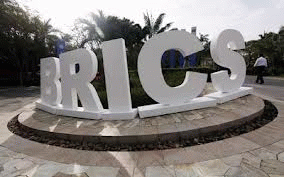Reality spells otherwise. The BRICS meet in Durban, South Africa, this Tuesday to, among other steps, create their own credit rating agency, sidelining the dictatorship -- or at least "biased agendas," in New Delhi's diplomatic take -- of the Moody's/Standard & Poor's variety. They will also further advance the idea of the BRICS Development Bank, with a seed capital of US$50 billion (only structural details need to be finalized), helping infrastructure and sustainable development projects.
Crucially, the US and the European Union won't have stakes in this Bank of the South -- a concrete alternative, pushed especially by India and Brazil, to the Western-dominated World Bank and the Bretton Woods system.
The huge political and economic differences among BRICS members are self-evident. But as they evolve as a group, the point is not whether they should be protecting the global economy from the now non-stop crisis of advanced casino capitalism.
The point is that, beyond measures to facilitate mutual trade, their actions are indeed becoming increasingly political - as the BRICS not only deploy their economic clout but also take concrete steps leading towards a multipolar world. Brazil is particularly active in this regard.
Inevitably, the usual Atlanticist, Washington consensus fanatics -- myopically -- can see nothing else besides the BRICS "demanding more recognition from Western powers."
Of course there are problems. Brazil, China and India's growth slowed down. As China, for instance, became Brazil's top trading partner -- ahead of the US -- whole sectors of Brazilian industry have suffered from the competition of cheap Chinese manufacturing.
But some long-term prospects are inevitable. BRICS will eventually become more forceful at the International Monetary Fund. Crucially, BRICS will be trading in their own currencies, including a globally convertible yuan, further away from the US dollar and the petrodollar.
That Chinese slowdown
It was Goldman Sachs' Jim O'Neill who coined the term BRIC (no South Africa then) in 2001. It's enlightening to check what he thinks about it now.
O'Neill points out that China, even growing by a "mere" 7.7% in 2012, "created the equivalent of another Greek economy every 11-and-a-half weeks." China's slowdown was "structural and cyclical" -- a "planned downturn" to control overheating and inflation.
The BRICS push is part of an irresistible global trend. Most of it is decoded here, in a new United Nations Development Program report. The bottom line; the North is being overtaken in the economic race by the global South at a dizzying speed.
According to the report, "for the first time in 150 years, the combined output of the developing world's three leading economies -- Brazil, China and India -- is about equal to the combined GDP of the long-standing industrial powers of the North."
The obvious conclusion is that, "the rise of the South is radically reshaping the world of the 21st century, with developing nations driving economic growth, lifting hundreds of millions of people from poverty, and propelling billions more into a new global middle class."
And bang in the middle of this process, we find an Eurasian epic; the development of the Russia-China strategic relationship.
It's always about Pipelineistan
Russian President Vladimir Putin is taking no prisoners; he wants to steer the BRICS towards "a full-scale strategic cooperation mechanism that will allow us to look for solutions to key issues of global politics together."
This will imply a common BRICS foreign policy -- and not only selective coordination on some themes. It will take time. It will be hard. Putin is very much aware of it.
(Note: You can view every article as one long page if you sign up as an Advocate Member, or higher).






